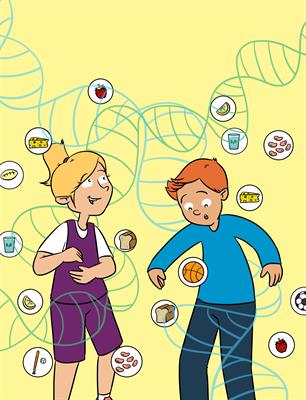
New ways to understand how foods affect me and my health!
Collection Editors
Kathryn Burton-Pimentel, Fiona Malcomson, Marjukka Kolehmainen, Lorraine Brennan, John MathersViews
298,417 viewsParticipating Sections
Submission Deadline
Closed
Articles

Human Health
11/01/2023
Organoids—Mini Guts Help Answer Big Questions...
Authors
Tamara Zietek, Eva Rath
Human Health
06/01/2023
Through a Crystal Ball: Using Bacterial...
Authors
Amira Metwaly, Ahmed Abdelaziz
Human Health
23/12/2022
Do All People With Obesity Have Increased Risk of...
Authors
Vibeke H. Telle-Hansen, Jacob J. Christensen, Gulla Aa...
Human Health
25/11/2022
Feed Your Mitochondria and Shape Your Body!
Authors
Laura Bordoni, Rosita Gabbianelli
Human Health
03/11/2022
How Does Lifestyle Affect Colorectal Cancer Risk?
Authors
Fiona C. Malcomson, Naomi D. Willis, John C. Mathers
Human Health
13/10/2022
Coffee: Is It a Friend or a Foe?
Authors
Eduardo Costa-Camilo, Raquel Colucas, Fátima O. Martins...
Human Health
22/08/2022
Are Red and Processed Meats Bad For Our Health?
Authors
Lieselot Y. Hemeryck, Sophie Goethals, Lieven Van...
Human Health
24/06/2022
Eat Fruits In-Season to Give Rhythm to Your Life
Authors
Álvaro Cruz-Carrión, Ma Josefina Ruiz de Azua, Francisca...
Human Health
21/06/2022
Can Eating Bacteria In Dairy Products Support...
Authors
Thomas Roder, Grégory Pimentel, Cornelia Bär, Ueli von Ah...
Human Health
23/05/2022
Are Eggs a Superpower for the Brain and Memory?
Authors
Maija P. T. Ylilauri, Jyrki K. Virtanen
Human Health
21/04/2022
Does It Matter What Kind of Dairy Products We Eat?
Authors
Amanda Rundblad, Kirsten B. Holven, Linn K. L. Øyri, Patrik...
Human Health
18/04/2022
Can Vitamins Slow Down the Body’s Aging Process?
Authors
Chanachai Sae-Lee, Julien De Biasi, John C. Mathers
Human Health
15/04/2022
What Can the Blood Tell us About Food and Health?
Authors
Stefania Noerman, Marjukka Kolehmainen, Kati Hanhineva
Human Health
15/04/2022
How Does Your Body Deal With Fast-Food Meals?
Authors
Nathalie Poupin, Sergio Polakof
Human Health
15/04/2022
How Can New Personalized Nutrition Tools Improve...
Authors
Katherine J. Li, Kathryn J. Burton-Pimentel, Elske M...
Human Health
11/04/2022
Can Personalized Nutrition Improve People’s Diets?
Authors
Katherine M. Livingstone, Carlos Celis-Morales, John C...About this collection
.png)
What we eat affects our bodies in many different ways. From changing our shape and size, to giving us the fuel to run. From keeping our hair and skin looking good, to affecting our risk of developing diseases like diabetes or cancer. However, what we eat can also affect each of us differently. This is because we all have different versions of genes, molecular regulators and even gut bacteria that affect how we respond to the foods that we eat. For example, one person may have versions of genes that means that they process (metabolize) some food components differently from how other people do. Another person may have versions of genes that make it easier for them to gain weight.
To understand how different foods affect our health and our risk of developing diseases, scientists use many different types of experiments. These range from laboratory studies in cells to studies carried out directly in humans that measure how we react to specific nutrients and foods, or to our whole eating pattern. Samples of blood, saliva and urine can be analyzed to reveal lots of information about how each person’s DNA and individual biology changes the way food affects their health. New methods called ‘-omics technologies’ allow us to quickly measure all molecules of a certain type that are present in a sample. For example, genomics is used to characterize all the genes and different versions of genes in a particular person; transcriptomics measures all the genes that are switched on in that person; and proteomics and metabolomics measure the corresponding proteins and small molecules or metabolites. This gives us a huge amount of new information about how what a person eats affects their metabolism and health. These kinds of studies can also help us to understand why particular foods might affect one person differently from another.
By better understanding how the effects of foods and nutrients change from person to person based on their DNA and other molecular regulators, we can start to find which types of diets may be better for different people. This idea is called ‘personalized nutrition’. For example, personalized nutrition might provide a basis for dietary advice to help individual people improve their diet and to stay healthy. This approach might also help find the best diet for people already suffering from a disease that is affected by diet.
This collection of articles focuses on the latest research in the field of nutrigenomics, from advances in technologies used for this research, to how foods are processed in the body and what this means for our health. At the core of the collection is the application of nutrigenomics as a basis to personalize nutritional advice for individuals and at a public health level.
This collection has been organized by NuGO and the NuGO Early Career Network (ECN). NuGo is an association of Universities and Research Institutes worldwide focusing on research on molecular nutrition, personalized nutrition, nutrigenomics and nutritional systems biology.
Would you like to submit to this collection?
For researchers interested in submitting to this Collection, please consult our author guidelines and check that you have all the essentials included before submitting
Editorial Board
Collection Editors
Science Mentors

Emilio Alarcon

Ricardo Alberca

Shyam Bansal

Asma Bashir

Priya Bhosale

Heleena Moni Bottu

Susana Couto Irving

Alexandra Dimitri

Christina Driver

Wael Elhenawy

Jamal Houssaini

Mei Fang Hsu

Wendy Huddleston

Jeeyon Jeong

Karishma Kaushik

Joseph Larkin

Medha Priyadarshini

Patricia Saleeby

Ananya Sen

Parvathy Venugopal

Sophia Wang




